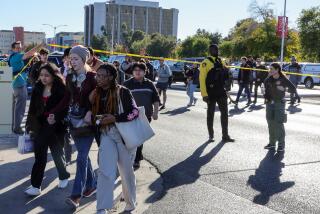Crusader for increased campus security after daughter’s murder
Howard K. Clery Jr., who crusaded for increased campus security and a landmark federal law requiring colleges to disclose crime statistics after his daughter was raped and murdered in her dorm room, has died. He was 77.
Clery died of a heart attack Jan. 1 at his home in Palm City, Fla., according to Security on Campus Inc., the nonprofit organization he co-founded with his wife, Constance.
His youngest child, Jeanne, was a freshman at Lehigh University in Bethlehem, Pa., in 1986 when another student gained entry to her dorm through three locking doors that had been propped open. She was a random victim, and as the Clerys learned about the case, they became convinced that she died because of “slipshod” campus security and accused the school of covering up campus crime, The Times reported in 1989.
They sued Lehigh, contending that their daughter never would have attended the university if the record of crimes on its campus -- 38 assaults and other violent crimes over a three-year period -- had been made public, according to a 1999 Times story. The lawsuit was settled for $2 million, which the couple used to found the nonprofit Security on Campus in 1987. Their daughter’s assailant is serving a life sentence.
Lobbying by the Clerys led to the passage in 1990 of what is now known as the Jeanne Clery Act. The law requires colleges and universities to reveal information about campus crime and security policies.
The couple also helped secure passage of more than 30 state and federal laws that deal with campus public safety, according to Security on Campus.
“When your daughter is slaughtered, you have two choices -- curl up and let the world go by or fight back,” Clery said in 1990, according to the Philadelphia Inquirer.
In fighting back, Clery said the couple was “helping others, but also ourselves.”
Born in Massachusetts in 1930, Clery contracted polio as a teenager and used a steel leg brace and canes for the rest of his life.
After earning bachelor’s and master’s degrees in business administration at Dartmouth College, he worked for the Gillette Co. in Boston, where he met his future wife. They were married in 1956.
He later was an executive with the Raytheon Co., Royal McBee and Safeguard Industries. In 1971, Clery purchased Rapidforms with a partner. As chief executive, Clery helped turn the regional printer of business forms into a national direct-mail company with $40 million in sales in 1987.
By 1991, he had become a full-time campus security activist.
In addition to his wife, he is survived by two sons, Howard Clery III and Benjamin Clery.
More to Read
Sign up for Essential California
The most important California stories and recommendations in your inbox every morning.
You may occasionally receive promotional content from the Los Angeles Times.








